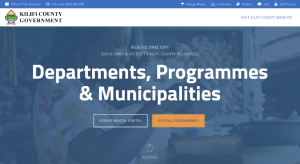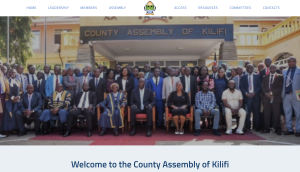Infrastructure and Accessibility
Includes roads network, communication, financial institutions, energy access, housing, market and urban Centres.
The roads in the county are classified in a manner that 326.2 Km are of bitumen standards,
542.3 gravel and 1139.5 earth surface, giving a total of 2008 Kmof classified road surface within the county. The county is envisioned in the Vision 2030 to be a resort city, therefore there is need to expand Malindi airport, Kilifi and Kijipwa airstrips to cater for the expected increase of visitors and residents in the county.
The county is covered by all the major mobile telephone service providers which include; Safaricom, Yu, Orange and Airtel. It has mobile telephone coverage of 75 percent and 7,037 landline connections. The county has 7 post offices and 5 sub post offices. The proportion of the population that has to travel 5km or more to the nearest post office is 78 percent. There are 70 cyber cafes mostly in the urban areas and thus there is need to prioritize the establishment of digital villages and more cyber cafes.
Access to financial services is generally on the increase with the advent of mobile phone money transfer services and agency banking. However, the county has only 10 commercial banks namely KCB, Equity, Cooperative, National Bank, Barclays, Standard Chartered Bank among others. There are 17 micro finance institutions namely Kenya Women Finance Trust, Faulu, Platinum Credit among others. SACCOs include Imarika Sacco, Lengo, Kilifi and Malindi farmers Sacco amongst others. The financial institutions in the county target 1 .2 million people; hence there is need for increased investment in this sector so as to tap the existing potential.
Education ensures that a population is empowered both socio-economically and politically so that they can participate in gainful activities and make informed decisions.
The county has 935 pre-schools, 492 primary schools, 120 secondary schools, 13 youth polytechnics, one college(KMTC- Kilifi) offering medical trainings and Pwani University a public institution which offering various courses. There is need to improve the physical infrastructure of the existing institutions and build more to ensure quality and access to education.
The main sources of energy in the county include; wood fuel, electricity, paraffin and solar energy which are mainly used for cooking and lighting. The number of trading Centres connected with electricity stands at 50 while over 80 percent of the households use wood fuel. The number of trading Centres connected with electricity is expected to increase as the county continues to implement the Rural Electrification Programme which is aimed at connecting rural Centres with electricity so as to promote wealth and employment creation. The county is currently promoting the use of renewable energy and use of energy saving jikos by households and institutions such as schools and hospitals. The county is also promoting the establishment of woodlots to ensure there is constant and sustainable supply of wood fuel.
There are a total of 78 trading Centres in the county with 3,809 registered traders in retail, wholesale and manufacturer. The major ones are; Kilifi, Mtwapa,Malindi,Mariakani and Watamu among others. The wholesalers mostly deal with consumer and hardware products while retail traders, who are in both rural and urban areas, deal mainly with food products. The manufacturers mostly deal in cement such as Rhino Cement Company in Rabai, Mombasa Cement Company in Vipingo, steel products in Mazeras, salt manufacturing by Kensalt and Krystalline Salt in Gongoni and Marereni, commercial starch in Mazeras, power generation in Rabai, soft drinks by Coca Cola and Picana in Mtwapa and Export Processing Zone (EPZ) in Mazeras and Mtwapa.
Majority of the houses in the county have walls made of mud/wood 59 percent as the main walling material, followed by brick/block at 22.05 percent and mud/cement at 5.95 percent. On the floor earth 73.5 percent as the main floor materials, cement 25.05 percent, tiles 1.15 percent on roofing Makuti leads with 41.4 percent, Corrugated iron sheets 32.9 percent and grass 20.2 percent as the main roofing materials. There are informal settlements coming up in the major urban Centres in the county especially Malindi and Kilifi towns.






